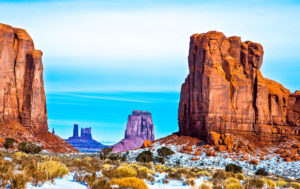No Thanks: Truthfulness That Honors Native Communities
 Monument Valley in the Navajo Nation
Monument Valley in the Navajo Nation For many, Thanksgiving is about families gathering and feasting upon meals traditionally associated with the occasion. But for others, it’s a national day of mourning that marks an established tradition of cultural erasure that glosses over colonial genocide, exploitation, and pillage of Indigenous communities.
This holiday week tragically began with militarized police assaulting water protectors at Standing Rock with tear gas, rubber bullets, concussion grenades, and water cannons in freezing temperatures late Sunday into the early hours of Monday.
What’s unfolding at Standing Rock in a way acts as a microcosm of the way Native welfare, land, and way of life have long been subjected to disregard by corporate and government interests. After all, the Dakota Access pipeline is being rerouted through the Standing Rock Sioux Tribe’s land due to Bismarck residents’ fear of potential harm to drinking water. Natives are now being forced to endure the desecration of sites sacred to them and be subject to ecological risks that neighboring white residents rejected, despite the pipeline directly violating the 1868 Treaty of Fort Laramie that states the land is reserved for “undisturbed use and occupation” of Native inhabitants.
But these aren’t things most of us like to consider, much less have genuine discussions about. Napoleon’s conclusion that the truth of history is but a fable agreed upon is a disturbing reminder that much of what we are taught and socialized to believe is distorted. Or, as Dan Brown’s The Da Vinci Code highlights, “When two cultures clash, the loser is obliterated, and the winner writes the history books—books which glorify their own cause and disparage the conquered foe.”
Sure, it may be difficult to teach children a more honest account of how native inhabitants were murdered or forced from their land to erect a nation that excludes them, but candor trumps sugar-coated propaganda that transforms the obscene into palatable myths.
This nauseating narrative of harmony between whites and Indigenous peoples and them coming together peacefully that yada-yada-yada’s over the way pilgrims first relied upon Native people to survive and subsequently ravaged them reinforces historical amnesia of the way settlers subverted Native life, culture, and land.
Devotion to fabricated narratives prevents us from being able to think critically about the false messages we receive. If can’t think critically about these messages, then we can’t appropriately challenge them and the way we tend to ignore this nation’s brutal history, and ongoing anti-Native oppression will continue unchecked. This problem is reminiscent of the denialism, silence, and recoil involved with confronting anti-Black racism long ago codified into our social systems.
For added perspective on Thanksgiving and the continued struggle of Indigenous people, I spoke with two members of the Feminist Humanist Alliance advisory board who are also of Native heritage.
Award-winning Mniconjou Lakota journalist and citizen of the Cheyenne River Sioux Tribe Taté Walker commented, “The Thanksgiving fairytale is so pervasive that people across the country blindly teach and celebrate a 400-year-old mythic “friendship” between the pilgrims and Indians while turning their backs on real and systemic violence happening now to Native people and allies at the hands of authorities protecting oil interests over the interests of future generations of water drinkers. Forget Plymouth Rock. Stand with Standing Rock.”
And grassroots activist and Miwok woman Desiree Kane said, “Non-native people on Thanksgiving, if they’re going to celebrate, need to be celebrating Native Americans and everything we’ve given to ensure they are literally able to live. Basically, celebrate, not shun, things like what we are doing now in Standing Rock by fighting to guarantee the very clean drinking water poured at their Thanksgiving table.”
Humanists believe in human-derived determination of justice and equality rather than divine requital. We can be catalysts for change by seeking out and listening to Native voices and working to empower Native people (helpful suggestions by Natives can be found on Mashable). We must be willing to crush the fables we’ve been conditioned to believe if we’re ever going to embrace the truth.
